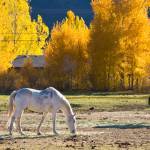Skunks on Horse Farms: Friends or Foes

The pungency of their primary defense mechanism is legendary. The telltale scent alerts humans and animals alike of their presence. The proximity of the two-toned marauders can usually be gauged by the intensity of the odor. The sharper the smell, the closer the culprits. More than one curious colt or mischievous mare have been the target of odiferous blasts. What’s to blame?
Skunks.
Just one of many woodland creatures that often mosey into stables, skunks typically skulk at night, surveying stables and barnyards for morsels of food.
As animal lovers, many horse owners will tolerate the occasional white-striped interloper with a casual no-foul, no-harm attitude. After all, every creature can lose its way at times. And skunks aren’t really harmful to horses, are they?
Yes, they can be.
Skunks are one of the principal carriers of the rabies virus in North America, and skunk bites have been implicated as the primary means by which horses contract rabies. All horses should be vaccinated for rabies, so a bite to an immunized horse does not necessarily prove fatal. Rabid skunks will typically exhibit abnormal behavior, and any skunk active in the daylight should be viewed warily.
In addition to the threat of rabies, skunks are an intermediate host for Sarcocystis neurona which causes equine protozoal myeloencephalitis (EPM), a crippling and sometimes fatal neurological disease. As an intermediate host, skunks carry the disease-causing protozoan in their bodies and cannot transmit EPM to horses. Transmission of the protozoan occurs when opossums, the primary source of infections to horses, feed on the carcasses of dead skunks, and consequently shed sporocysts on hay and feed.
While the occasional nighttime sighting of a skunk around the barn can be chalked up to happenstance, frequent sightings, especially in the light of day, should be dealt with accordingly. Professional trappers will often remove skunks from premises and relocate them far away from human contact. A local feed store might know of individuals trained in wildlife relocation.








